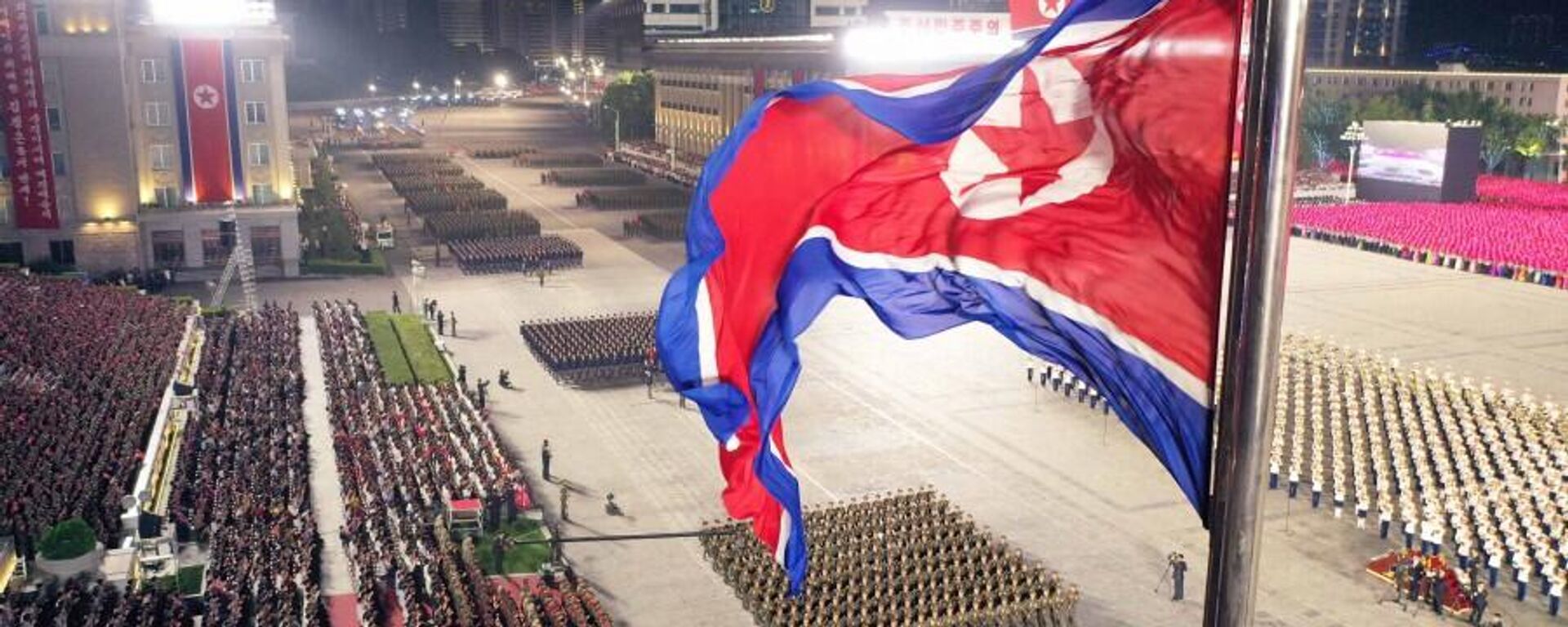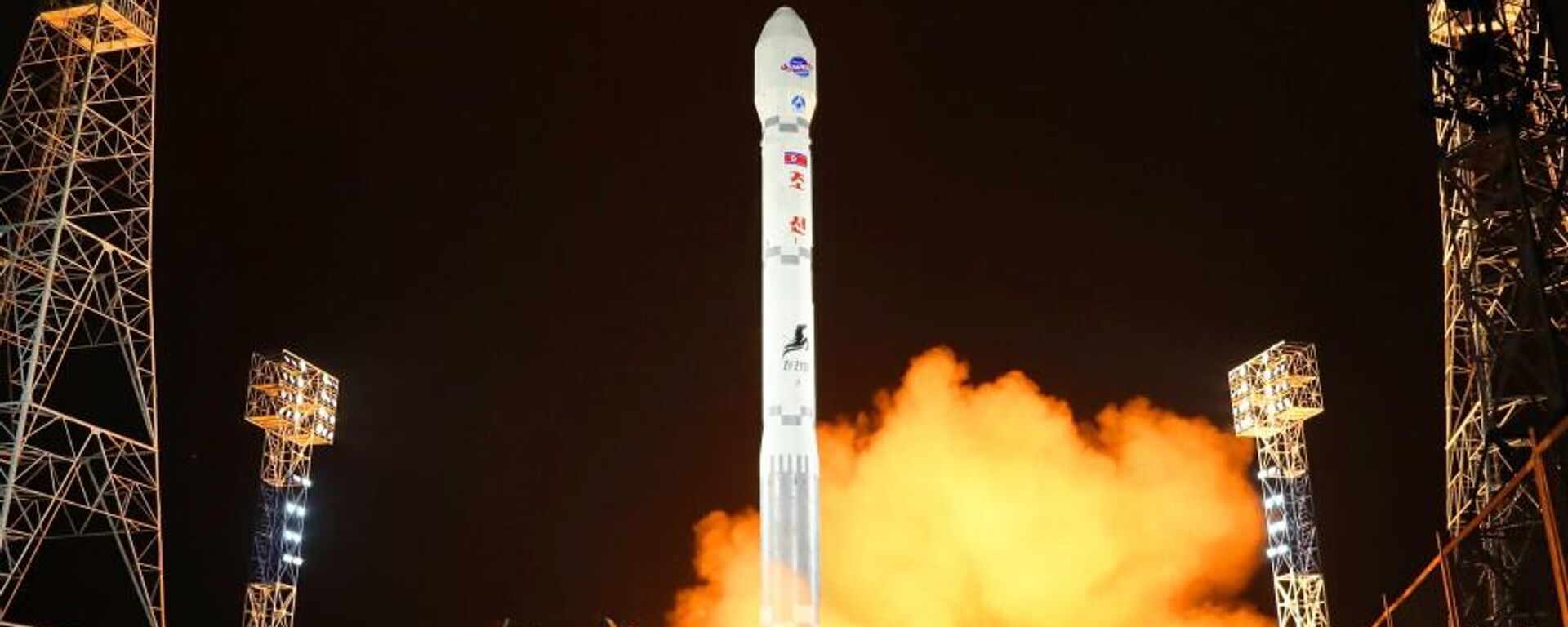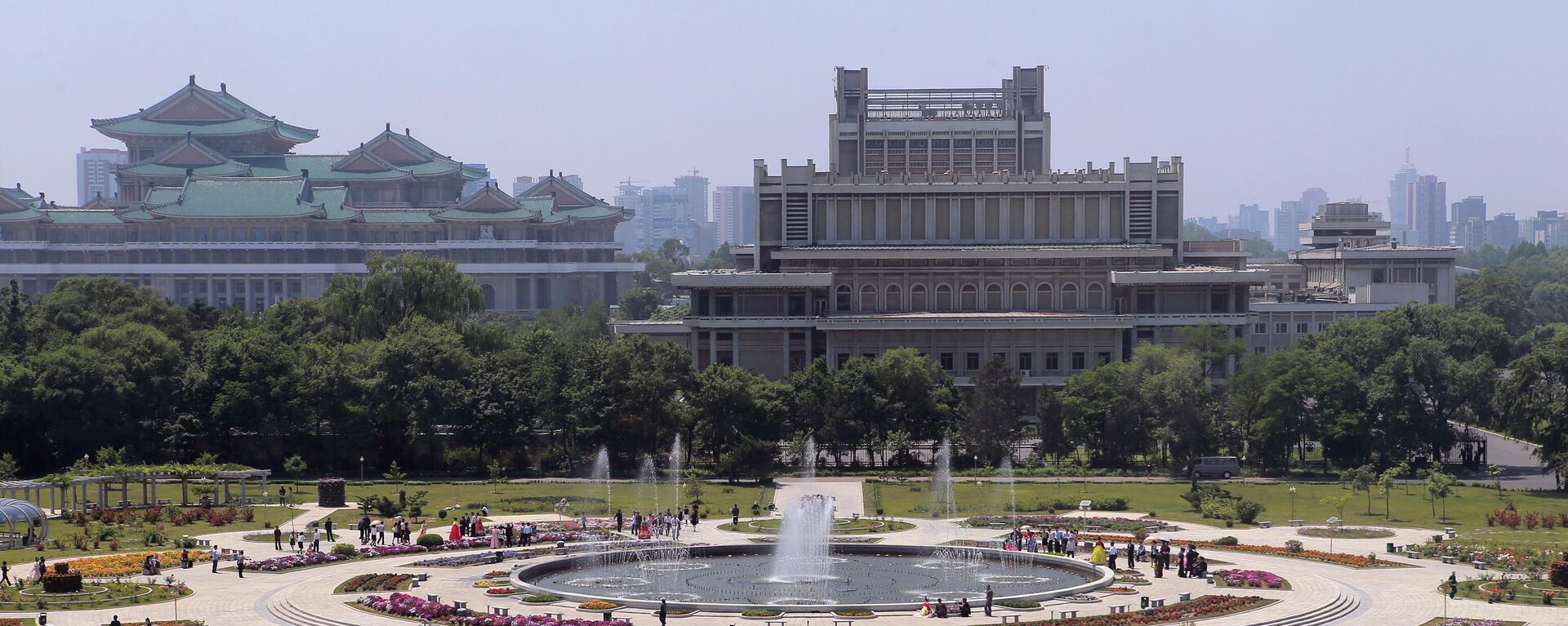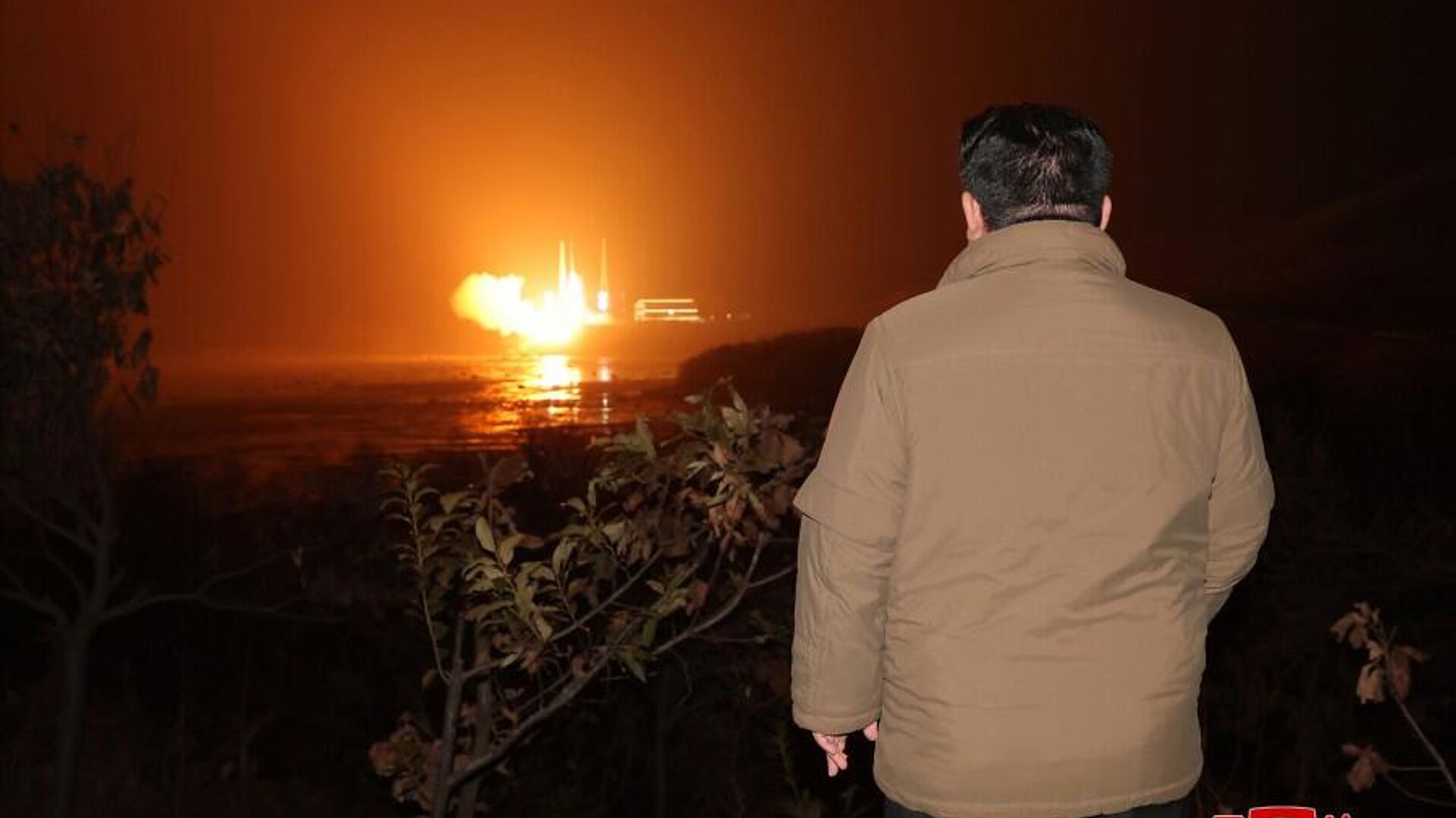https://sputnikglobe.com/20231122/why-did-north-korea-launch-spy-satellite-1115133185.html
Why Did North Korea Launch Spy Satellite?
Why Did North Korea Launch Spy Satellite?
Sputnik International
The launch of North Korea’s homegrown spy satellite into orbit willlikely be "positive development for the region," said Russian scholar and expert in Korean studies Andrei Lankov.
2023-11-22T13:33+0000
2023-11-22T13:33+0000
2023-11-22T13:33+0000
north korea
satellite
kim jong-un
north korea missile launch
analysis
andrei lankov
fumio kishida
south korea
pyongyang
us national security council
https://cdn1.img.sputnikglobe.com/img/07e7/0b/16/1115123665_0:45:900:551_1920x0_80_0_0_9831e703f6d67b1ee00f9114602ab1f0.jpg
Pyongyang announced on Tuesday that it had successfully launched a military reconnaissance satellite. According to North Korea's state news agency, the rocket was launched from the Sohae Cosmodrome. The Chollima-1 carrier rocket reportedly following its set course, putting “the reconnaissance satellite ‘Malligyong-1’" into orbit. North Korean leader Kim Jong Un is said to have observed the launch.While the launch raised anticipated alarm bells from South Korea and Japan, the emergence of North Korea’s homegrown spy technology in orbit will most likely become a "positive development for the region," said Russian scholar and expert in Korean studies Andrey Lankov.Earlier, both top brass in both South Korea and Japan said that they detected the North Korean launch, with Tokyo prompted to briefly issue a J-Alert missile warning for Okinawa.The Democratic People's Republic of Korea (DPRK) notified its neighbors of its plans to make a third attempt to put a reconnaissance satellite into orbit. The previous two attempts, in May and August, were unsuccessful. While the new launch was expected to take place between November 22 and December 1, it was carried out ahead of schedule.After receiving the notification, Seoul warned Pyongyang against proceeding with the launch. Japan's prime minister, Fumio Kishida, hurried to say that Tokyo was ‘coordinating its response’ with South Korea and the United States. Use of ballistic missile technology would be considered a violation of UN resolutions, Kishida stated.Washington also condemned the launch, with US National Security Council spokesperson Adrienne Watson saying it “raises tensions and risks destabilizing the security situation in the region and beyond.” South Korea has also vowed to partially suspend its 2018 comprehensive military agreement with North Korea over the satellite launch.Pyongyang, under 11 rounds of UN sanctions over its past nuclear and missile tests, is banned by the organization from conducting satellite launches, under the claim that they serve as a cover for tests of missile technology. In response, the DPRK's National Aerospace Technology Administration argued the legitimate right of North Korea to enhance its self-defense capabilities in the face of “the enemies’ dangerous military moves.”The South Korean authorities have claimed that the third launch was successful because the North has received Russian technological assistance for its spy satellite program. However, Seoul stopped short of providing any evidence. North Korea’s spy satellite launch certainly did not come as a surprise for Seoul, with Pyongyang’s plans the subject of discussions among Republic of Korea’s top brass already on November 19. Seoul is also set to launch its own first military reconnaissance satellite on a SpaceX Falcon 9 rocket from the Vandenberg Air Force Base in California by the end of this month.The importance of reconnaissance systems, including space intelligence, clearly cannot be underestimated today, Dmitry Stefanovich of the Moscow-based Institute of World Economy and International Relations with the Russian Academy of Sciences told Sputnik. Any country that does not have the opportunity to obtain this information on the open market, or does not have allies with such a structure in place and ready to share information is in danger of being blindsided, and, accordingly, seeks to either purchase or create it. Everyone wants to have their own space infrastructure, he added.The current successful launch of a military reconnaissance satellite by DPRK “demonstrates a new level of North Korean military capabilities, emphasized Stefanovich.After the impending launch was announced, US aircraft carrier the Carl Vinson arrived at the port of Busan on Tuesday, in a show of support. However, it is Washington’s maneuvering and saber-rattling on the Korean Peninsula that has prompted the Democratic People's Republic of Korea to ramp up its defense capabilities - so the DPRK responded by boosting its missile testing.Amid the strengthening of US-Japan-South Korea so-called strategic cooperation in the Indo-Pacific region, Pyongyang has repeatedly accused Washington and its allies of exacerbating military tensions, citing large-scale military exercises and increased presence of US strategic assets in the region. The three countries also held a summit hosted by President Biden at Camp David in August. It was attended by Joe Biden, South Korean President Yoon Suk-yeol, and Japanese Prime Minister Fumio Kishida. While the three leaders hailed a “new era of cooperation” between their countries, the DPRK media warned that North Korea would reserve the right to target any US strategic nuclear forces stationed in South Korea, and characterized the recent series of drills as an “intentional provocative maneuver for nuclear war” by Washington.
https://sputnikglobe.com/20231116/north-koreas-warning-roars-offensive-actions-promised-in-face-of-us-provocations-1114998972.html
https://sputnikglobe.com/20231122/north-korea-successfully-launches-spy-satellite--1115125226.html
https://sputnikglobe.com/20231114/north-korea-blasts-g7-bloc-as-cold-war-relic-that-should-be-dismantled-immediately-1114944909.html
north korea
south korea
pyongyang
Sputnik International
feedback@sputniknews.com
+74956456601
MIA „Rosiya Segodnya“
2023
News
en_EN
Sputnik International
feedback@sputniknews.com
+74956456601
MIA „Rosiya Segodnya“
Sputnik International
feedback@sputniknews.com
+74956456601
MIA „Rosiya Segodnya“
north korea news, north korea launches missile, north korea launches missile today, north korea launches missile into south korea, north korea satellite launch
north korea news, north korea launches missile, north korea launches missile today, north korea launches missile into south korea, north korea satellite launch
Why Did North Korea Launch Spy Satellite?
After two previously unsuccessful attempts earlier this year, North Korea announced it had launched a military reconnaissance satellite on a new rocket on Tuesday, after earlier notifying Japan of its plans.
Pyongyang announced on Tuesday that it had successfully
launched a military reconnaissance satellite. According to North Korea's state news agency, the rocket was launched from the Sohae Cosmodrome. The
Chollima-1 carrier rocket reportedly following its set course, putting “the reconnaissance satellite ‘
Malligyong-1’" into orbit. North Korean leader Kim Jong Un is said to have observed the launch.
While the launch raised anticipated alarm bells from
South Korea and Japan, the emergence of North Korea’s homegrown spy technology in orbit will most likely become a "positive development for the region," said Russian scholar and expert in Korean studies
Andrey Lankov.
“The South [South Korea], partly on its own, partly with the help of the Americans, has a very good idea of what is happening in the North. North Korea's lack of operational, real-time information about what is taking place in the South significantly heightens apprehension in Pyongyang. So, paradoxically, the appearance of reconnaissance satellites by Pyongyang will most likely render the situation on the Korean Peninsula more stable,” Lankov explained.
Earlier, both top brass in both South Korea and Japan said that they detected the North Korean launch, with Tokyo prompted to briefly issue a J-Alert missile warning for Okinawa.

16 November 2023, 13:52 GMT
The Democratic People's Republic of Korea (DPRK)
notified its neighbors of its plans to make a third attempt to put a reconnaissance satellite into orbit. The previous two attempts, in May and August, were unsuccessful. While the new launch was expected to take place between November 22 and December 1, it was carried out ahead of schedule.
After receiving the notification,
Seoul warned Pyongyang against proceeding with the launch. Japan's prime minister, Fumio Kishida, hurried to say that Tokyo was ‘coordinating its response’ with South Korea and the United States. Use of ballistic missile technology would be considered a violation of UN resolutions, Kishida stated.
Washington also condemned the launch, with US National Security Council spokesperson Adrienne Watson saying it “raises tensions and risks destabilizing the security situation in the region and beyond.” South Korea has also vowed to partially suspend its 2018 comprehensive military agreement with North Korea over the satellite launch.
Pyongyang, under 11 rounds of UN sanctions over its past nuclear and missile tests, is banned by the organization from conducting satellite launches, under the claim that they serve as a cover for tests of missile technology. In response, the DPRK's National Aerospace Technology Administration argued the legitimate right of North Korea to enhance its self-defense capabilities in the face of “
the enemies’ dangerous military moves.”
"UN Security Council resolutions, for which Russia also voted, clearly prohibit North Korea from launching any satellites using ballistic missile technology. Any missile launch, be it military or civilian, is automatically a violation of existing Security Council sanctions,” underscored Lankov, who is Director of Korea Risk Group.
The South Korean authorities have claimed that the third launch was successful because the North has received Russian technological assistance for its spy satellite program. However, Seoul stopped short of providing any evidence. North Korea’s spy satellite launch certainly did not come as a surprise for Seoul, with Pyongyang’s plans the subject of discussions among Republic of Korea’s top brass already on November 19. Seoul is also set to launch its own first military reconnaissance satellite on a
SpaceX Falcon 9 rocket from the
Vandenberg Air Force Base in California by the end of this month.
The importance of
reconnaissance systems, including space intelligence, clearly cannot be underestimated today,
Dmitry Stefanovich of the Moscow-based Institute of World Economy and International Relations with the Russian Academy of Sciences
told Sputnik. Any country that does not have the opportunity to obtain this information on the open market, or does not have allies with such a structure in place and ready to share information is in danger of being blindsided, and, accordingly, seeks to either purchase or create it. Everyone wants to have their own space infrastructure, he added.
The current successful launch of a military reconnaissance satellite by DPRK “demonstrates a new level of North Korean military capabilities, emphasized Stefanovich.
“They have already demonstrated that they have good ballistic missiles. Now, apparently, they will have good space rockets and the ability to control satellites I orbit. I wouldn't call it a threat. But in a global sense, of course, our arms race in space is also heating up,” the expert added.

22 November 2023, 08:07 GMT
After the impending launch was announced,
US aircraft carrier the Carl Vinson arrived at the port of Busan on Tuesday, in a show of support. However, it is Washington’s maneuvering and
saber-rattling on the Korean Peninsula that has prompted the Democratic People's Republic of Korea to ramp up its defense capabilities - so the DPRK responded by boosting its
missile testing.
Amid the strengthening of
US-Japan-South Korea so-called strategic cooperation in the Indo-Pacific region, Pyongyang has repeatedly accused Washington and its allies of exacerbating military tensions, citing
large-scale military exercises and increased presence of US strategic assets in the region. The three countries also held a
summit hosted by President Biden at Camp David in August. It was attended by Joe Biden, South Korean President Yoon Suk-yeol, and Japanese Prime Minister Fumio Kishida. While the three leaders hailed a “new era of cooperation” between their countries, the DPRK media warned that North Korea would reserve the right to target any US strategic nuclear forces stationed in South Korea, and characterized the recent series of drills as an “
intentional provocative maneuver for nuclear war” by Washington.

14 November 2023, 11:29 GMT







